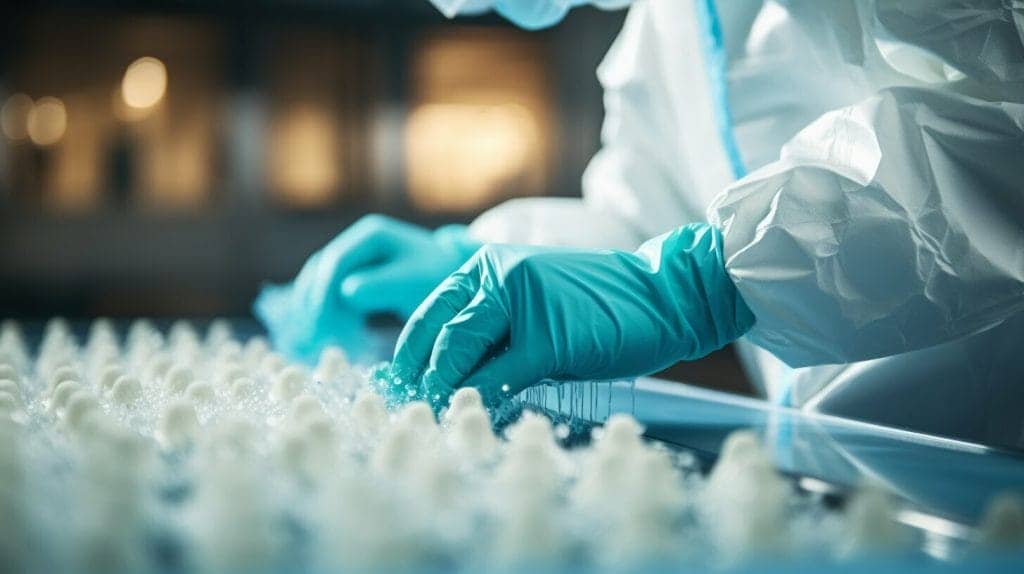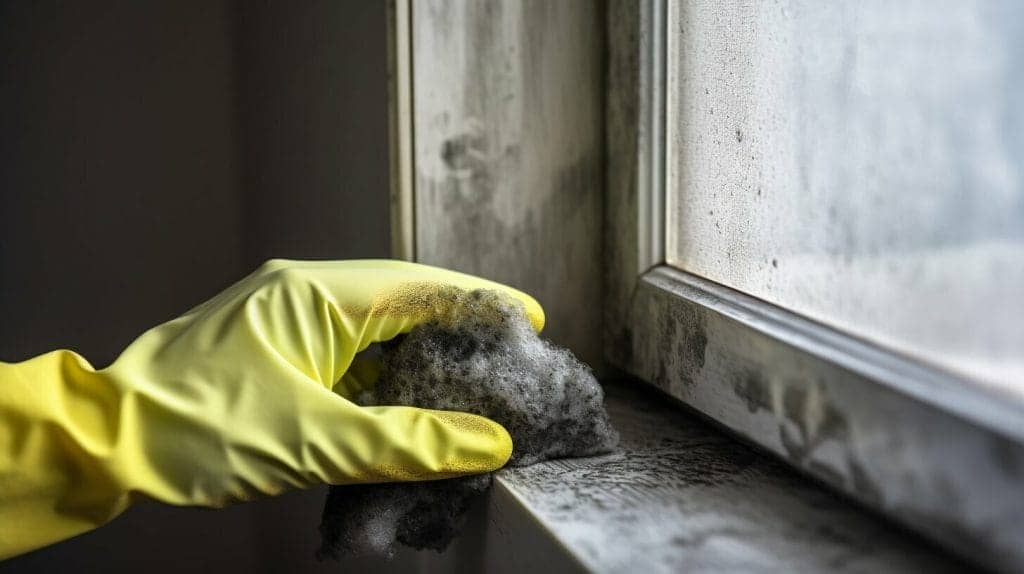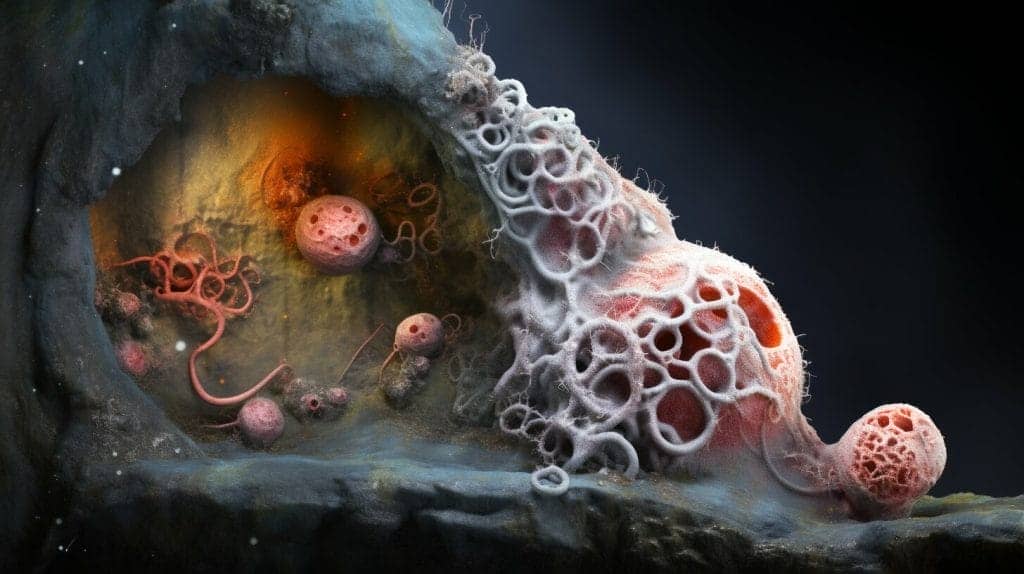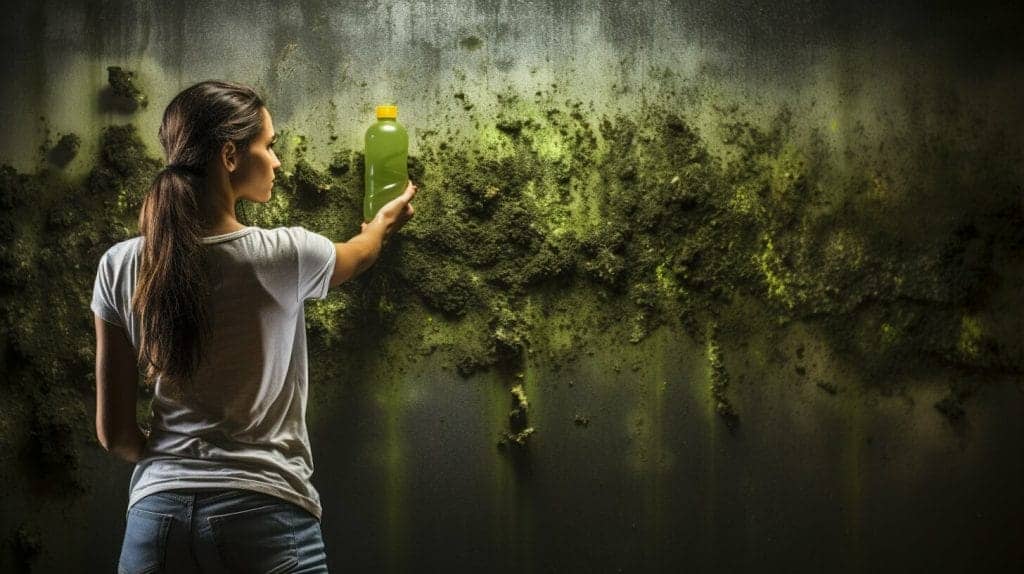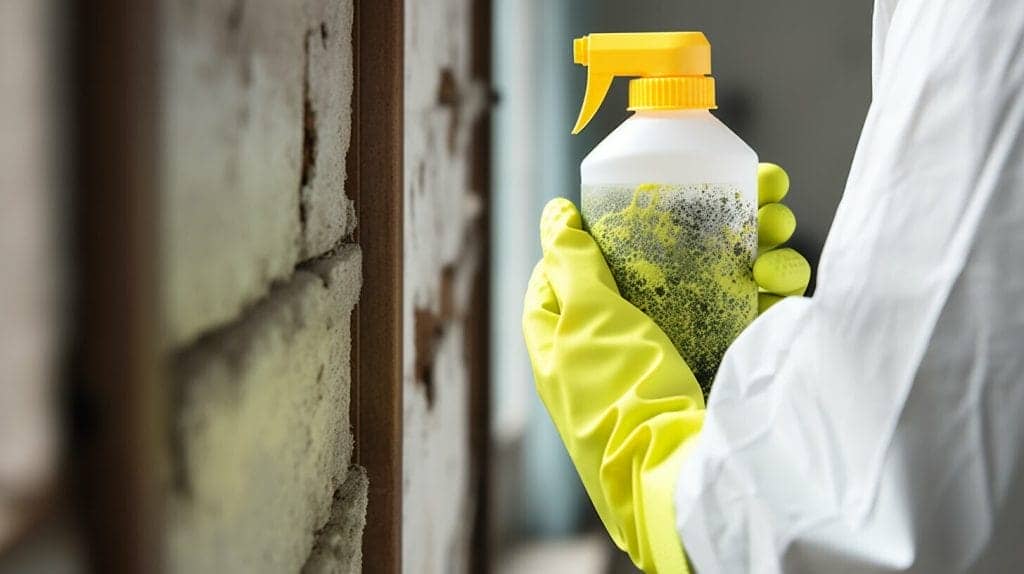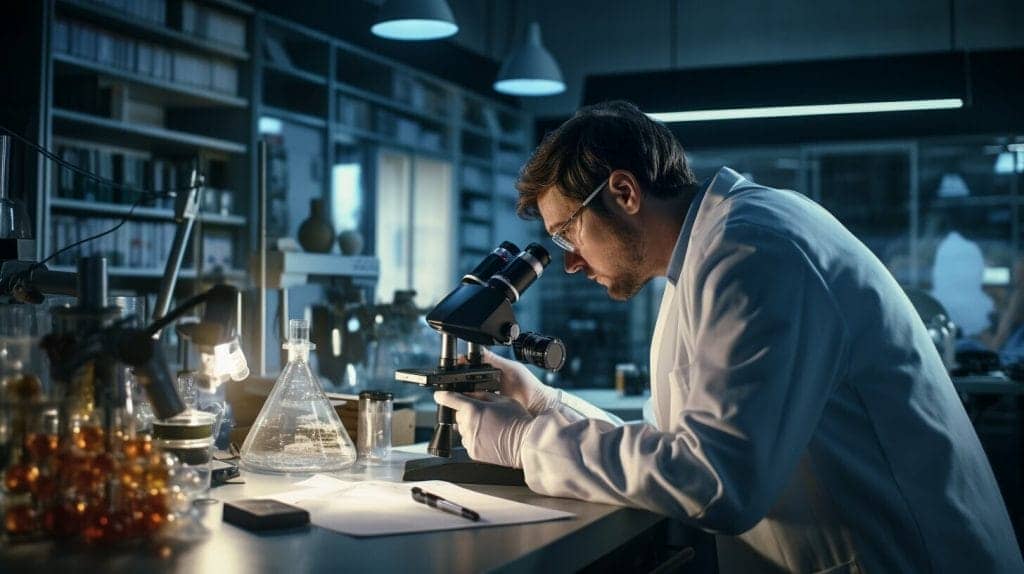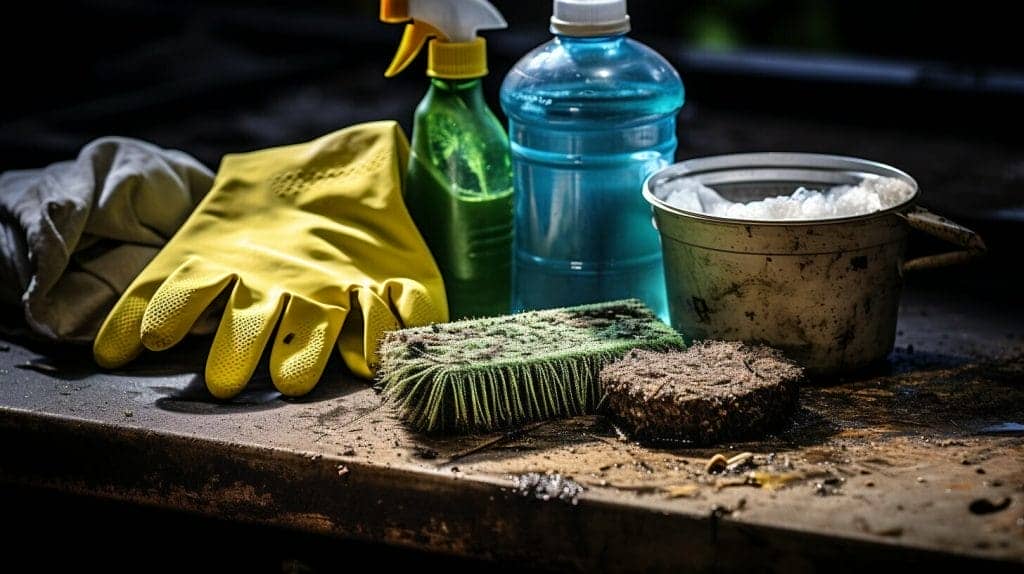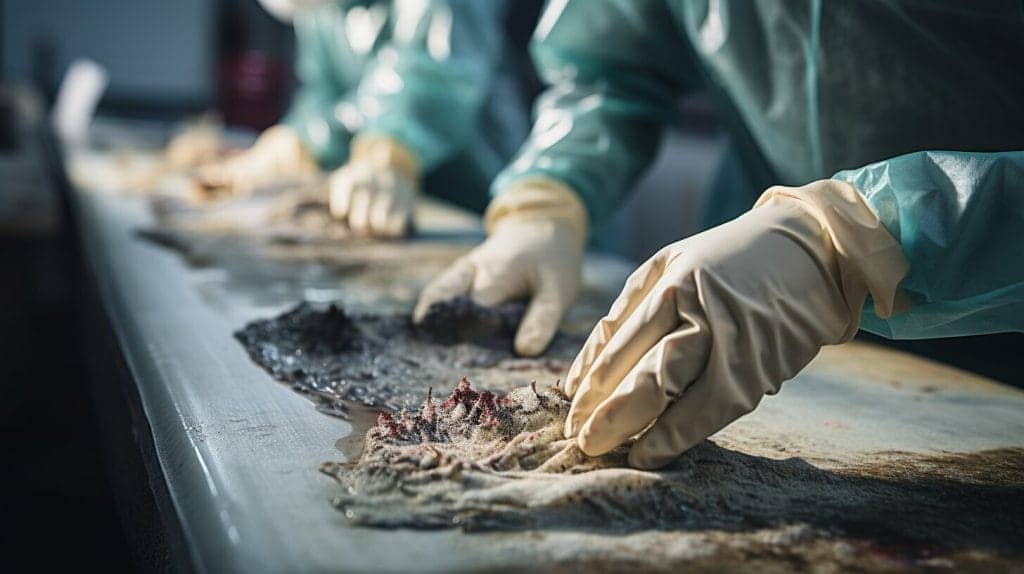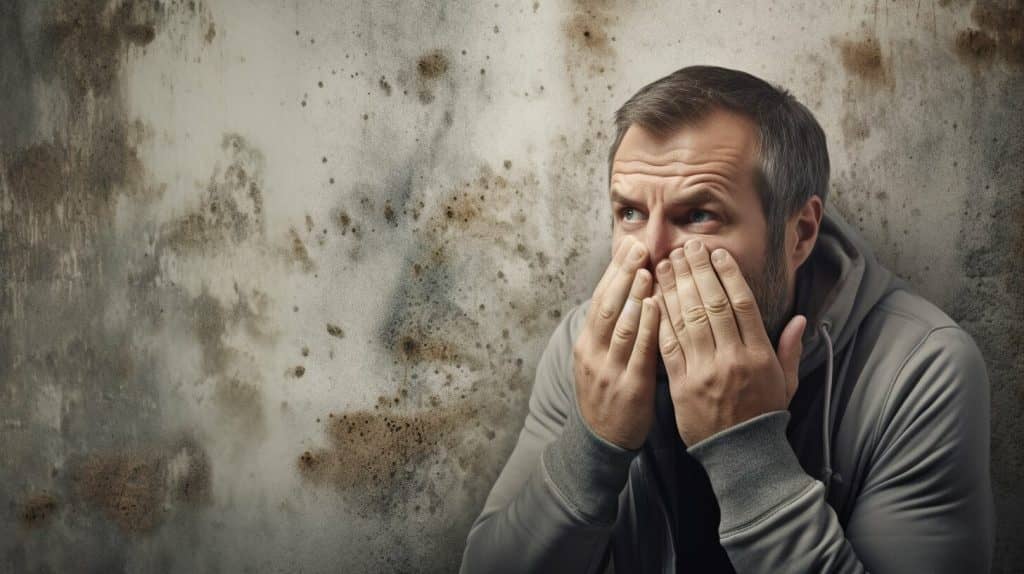When individuals are exposed to mold, they may experience a range of symptoms, from mild allergic reactions to more severe respiratory issues. While some people may recover quickly, others may require more extensive care to manage their symptoms and promote recovery. In this section, we’ll explore expert tips for mold toxicity patient care and emphasize the importance of prompt and appropriate treatment.
Key Takeaways
- Proper care is crucial for managing mold-related illness.
- Common symptoms of mold exposure include respiratory issues, allergic reactions, and skin irritation.
- Expert tips for mold toxicity patient care can help individuals recover more quickly and manage symptoms more effectively.
Understanding Mold Toxicity
Mold toxicity is a serious health concern that can result from exposure to mold and its toxins. Mold spores can be found everywhere, but when they accumulate and grow in damp areas, they can cause health problems.
When an individual inhales or comes into contact with mold toxins, it can cause a range of symptoms from mild to severe. Common symptoms of mold toxicity include respiratory issues, skin irritation, headaches, fatigue, and cognitive problems.
It’s important to note that not everyone who is exposed to mold will develop symptoms. The severity of symptoms can vary depending on factors such as age, overall health, and the length and intensity of exposure.
Understanding Mold Toxicity
Mold toxicity occurs when an individual is exposed to high levels of mold toxins. This can happen in a variety of settings, such as homes, schools, and workplaces. Mold can grow in damp or humid environments, such as basements, bathrooms, and kitchens.
When mold grows, it releases spores that can become airborne and spread throughout a space. These spores can be inhaled or come into contact with the skin, causing health problems. In some cases, exposure to mold can lead to long-term health issues.
The Importance of Mold Toxicity Patient Care
Mold toxicity patient care is essential to prevent and address the risks and complications associated with mold-related illnesses. These illnesses are caused by exposure to toxic mold spores commonly found in damp environments and can result in a wide range of symptoms, including respiratory problems, fatigue, allergies, skin irritation, and more.
Proper care for mold-related illnesses can help in the prevention of serious health conditions, such as asthma, bronchitis, and even lung cancer. It can also assist in the restoration of overall health and wellness, improving quality of life in many ways.
At the core of mold toxicity patient care is the provision of comprehensive treatment plans that address all aspects of the illness, including both physical and mental health. This includes the identification of the root cause of the illness, minimization of future mold exposure, and the implementation of personalized treatment plans that may include dietary changes, supplements, detox protocols, and other medical treatments.
It’s important to seek specialized care for mold toxicity to ensure effective management of the illness. Healthcare professionals with expertise in mold-related illnesses can offer comprehensive care tailored to individual needs, providing patients with the best possible outcomes.
Holistic Approach to Mold Toxicity Patient Care
Managing mold toxicity requires a comprehensive approach that considers the whole person, including physical, mental, and emotional health. While traditional medical treatments, such as antifungal medications and immune system boosters, are essential components of care, complementary therapies and lifestyle adjustments can also play a significant role in promoting healing.
Integrative medicine, a holistic approach that combines conventional medical treatments with complementary therapies, can be particularly effective in managing mold toxicity. Techniques such as acupuncture, massage, and meditation can help relieve symptoms, reduce stress, and improve overall well-being.
Complementary Therapies for Mold Toxicity
Acupuncture: Acupuncture is a technique that involves inserting thin needles into specific points on the body to alleviate pain and promote healing. It is thought to work by stimulating the nervous system, improving blood flow, and releasing endorphins.
Massage: Massage therapy can help ease muscle tension, improve circulation, and reduce stress. It can also help alleviate symptoms such as headaches, joint pain, and fatigue.
Meditation: Meditation is a practice that involves focusing the mind on a particular object, thought, or activity to promote relaxation and mental clarity. It can be especially helpful for managing stress and anxiety, which are often present in mold toxicity patients.
Lifestyle Adjustments for Mold Toxicity
A healthy lifestyle can also play a crucial role in managing mold toxicity. Eating a balanced diet that is rich in nutrients and antioxidants can support the body’s detoxification processes and boost the immune system. Regular exercise can help improve circulation, reduce inflammation, and reduce stress.
Other lifestyle adjustments that may be helpful for managing mold toxicity include:
- Avoiding exposure to other toxic substances, such as cigarette smoke and chemical cleaners
- Reducing stress through relaxation techniques, such as yoga or mindfulness meditation
- Getting plenty of rest and practicing good sleep hygiene
- Creating a healthy home environment by reducing clutter, improving ventilation, and addressing water damage promptly
By incorporating complementary therapies and lifestyle adjustments into a mold toxicity patient’s care plan, healthcare providers can provide a more comprehensive and effective approach to treatment. Integrative medicine can help patients manage symptoms, reduce stress, and improve their overall well-being.
Oasis Medical Institute: Leading the Way in Mold Toxicity Patient Care
Oasis Medical Institute is a renowned medical facility located in Tijuana, MX, dedicated to providing holistic care for mold toxicity patients. With a team of expert healthcare professionals and the leadership of Dr. Francisco Contreras MD, Oasis Medical Institute offers a comprehensive approach to mold toxicity treatment.
Their state-of-the-art facility is equipped with cutting-edge technology and specialized tools to diagnose and treat mold-related illnesses. They offer a wide range of services, including integrative medicine, detoxification protocols, nutrition counseling, and more, to support patients in their journey towards recovery.
| Services Offered | Description |
|---|---|
| Integrative Medicine | Includes therapies such as acupuncture, massage, and mindfulness practices to complement traditional medical treatments. |
| Detoxification Protocols | Personalized protocols to eliminate mold toxins from the body and enhance overall healing. |
| Nutrition Counseling | Expert guidance on dietary adjustments and supplements to support the body’s detoxification and healing processes. |
| Specialized Care | Experienced healthcare professionals with expertise in mold-related illnesses offer targeted treatment plans. |
At Oasis Medical Institute, patients can expect compassionate care and personalized attention throughout their treatment journey. With a focus on a holistic approach, they prioritize the physical, emotional, and mental well-being of their patients.
Oasis Medical Institute: Leading the Way in Mold Toxicity Patient Care.
For those seeking a comprehensive and integrative approach to mold toxicity patient care, Oasis Medical Institute offers advanced treatment options and personalized care plans. Contact them today to schedule a consultation and take the first step towards a healthier, mold-free life.
The Role of Detoxification in Mold Toxicity Patient Care
Detoxification plays a vital role in mold toxicity patient care by eliminating mold toxins from the body and supporting the body’s natural healing processes. This is especially important for individuals who have experienced prolonged or repeated exposure to mold, as it can lead to serious health complications.
A comprehensive mold detox protocol may include a combination of approaches such as dietary changes, nutritional supplements, and specialized treatments such as IV therapy or hyperbaric oxygen therapy. These therapies work together to support the liver and other organs in eliminating mold toxins from the body.
At Oasis Medical Institute, patients undergo a thorough evaluation to determine the most effective mold detox protocol for their unique needs. This may include specialized testing to identify specific toxins or nutritional deficiencies that may be contributing to their symptoms.
| Benefits of Detoxification for Mold Toxicity Patients |
|---|
| Improved immune function: Detoxification can help boost the body’s natural defenses, making it better equipped to fight off infections and other illnesses. |
| Reduced inflammation: Mold toxins can cause inflammation throughout the body, which can contribute to a range of symptoms. Detoxification helps to reduce inflammation and promote healing. |
| Enhanced energy and vitality: Patients often report feeling more energized and alive following a mold detox protocol, as toxins are removed and the body is able to function more efficiently. |
Supplements and Nutritional Support
Many patients benefit from incorporating supplements and other nutritional support into their mold detox protocol. This may include targeted vitamins and minerals, probiotics, and antioxidants. These supplements can help support the body’s natural detoxification pathways and promote overall healing.
A healthy, nutrient-dense diet is also a critical component of mold toxicity patient care. Patients are encouraged to eat a diet rich in fruits, vegetables, and whole grains, while minimizing processed and inflammatory foods.
At Oasis Medical Institute, patients work closely with a team of healthcare professionals to develop a personalized nutrition plan that supports their unique needs and promotes optimal health.
The Importance of Creating a Safer Environment for Mold Toxicity Patients
When caring for someone with mold toxicity, it is crucial to create a safe environment that minimizes their risk of exposure to mold. This can help alleviate symptoms and support their recovery. Here are some practical tips for creating a safer environment:
- Identify and address sources of mold: Check for leaks, water damage, and humidity issues in the home or workplace. Address any mold growth promptly and thoroughly.
- Improve ventilation: Use fans, open windows, and consider installing a dehumidifier or air purifier to improve air flow and reduce moisture levels.
- Clean regularly: Use mold-resistant products and regularly clean surfaces that may trap mold spores, such as carpets and upholstery. Discard moldy or water-damaged items.
- Avoid certain foods: Some foods can exacerbate mold toxicity symptoms. Consider avoiding sugary, processed, or moldy foods. Focus on fresh, organic fruits and vegetables, lean proteins, and healthy fats.
“Creating a safer environment can help alleviate symptoms and support recovery.”
By implementing these and other strategies, you can help reduce the risk of mold exposure and improve the quality of life for those with mold toxicity.
Mold Toxicity Recovery: Stages and Expectations
The recovery process for mold toxicity can be challenging, but with proper care, it is possible to regain health and quality of life. Recovery from mold toxicity can take time, and the duration of the recovery process can vary from person to person. However, there are typical stages of recovery that most individuals can expect to experience.
The first stage of mold toxicity recovery is the identification and removal of the source of the mold contamination. This step is crucial to prevent further exposure to mold toxins and promote healing.
The second stage involves detoxification to eliminate mold toxins from the body. This process can take several weeks or even months, depending on the severity of the mold-related illness. It is essential to work with a healthcare professional to develop an individualized detox protocol that addresses the specific needs of the patient.
The third stage of recovery focuses on restoring the body’s natural balance and promoting overall healing. This can include adopting a nutrient-rich diet, incorporating exercise into the daily routine, and practicing stress-reducing techniques.
It is important to note that the recovery process is not always linear, and setbacks can occur. Patients must be patient with themselves and trust the process, focusing on incremental improvements rather than expecting an overnight cure.
During the recovery process, it is essential to track symptoms carefully, as this can provide valuable insights into progress and areas that may require additional attention. Individuals should also maintain open communication with their healthcare provider and report any new or worsening symptoms promptly.
Managing Mold Toxicity Symptoms
It is common for individuals in the recovery process to experience various symptoms related to mold toxicity. These symptoms can include respiratory issues, fatigue, brain fog, and muscle weakness, among others. Patients can manage these symptoms by practicing good self-care techniques, such as getting adequate rest, staying hydrated, and reducing stress levels.
Other strategies for managing mold toxicity symptoms include taking specific supplements and medications as prescribed by a healthcare professional and pursuing alternative therapies such as acupuncture or massage.
By adopting a holistic approach to mold toxicity patient care, patients can manage symptoms more effectively, reduce the risk of complications, and promote overall healing.
The Role of Nutrition in Mold Toxicity Patient Care
Nutrition plays a critical role in the care of individuals with mold-related illnesses. Eating a nutrient-dense diet that supports the body’s detoxification and healing processes can help alleviate symptoms and promote recovery.
Dr. Francisco Contreras MD, a leading expert in mold toxicity treatment at Oasis Medical Institute, recommends avoiding inflammatory foods such as sugar, processed meats, and dairy products. Instead, patients should consume a variety of whole foods such as fruits, vegetables, and lean proteins.
Supplements can also support the body’s detoxification processes. Dr. Contreras often recommends probiotics, which help restore gut health, and glutathione, which aids in liver detoxification.
It is important to work with a healthcare professional to create an individualized nutrition plan that addresses individual health needs and goals.
Managing Mold Toxicity Symptoms
Managing mold toxicity symptoms is an important aspect of mold toxicity patient care. Symptoms can vary from person to person, with some experiencing mild reactions and others experiencing more severe symptoms. It is important to track symptoms and work with a healthcare professional to develop a symptom relief plan.
Some common symptoms of mold exposure include:
- Coughing
- Sneezing
- Runny or stuffy nose
- Headache
- Fatigue
- Irritated eyes, nose, throat or skin
While symptom relief techniques may differ depending on the individual, some suggested methods may include:
- Using a HEPA air filter to reduce airborne mold spores
- Keeping the home dry and properly ventilated
- Using a dehumidifier to regulate indoor humidity levels
- Cleaning and disinfecting moldy surfaces
Stress management techniques such as yoga, meditation, or deep breathing exercises may also be helpful in managing symptoms. It is important to talk to your healthcare professional about any new or persistent symptoms and to seek specialized care if needed.
“Working with a healthcare professional who has experience in mold-related illnesses is key in developing a plan to manage symptoms and promote recovery.”
Seeking Specialized Care for Mold Toxicity
When it comes to mold-related illnesses, seeking specialized care is crucial for effective treatment. Healthcare professionals who have expertise in this area can provide targeted treatment plans that address mold toxicity patient care from a holistic perspective. This includes understanding the potential risks and complications associated with untreated mold-related illnesses and incorporating complementary therapies and lifestyle adjustments to manage mold-related issues effectively.
Specialized care providers can also offer diagnostic testing to confirm the presence of mold toxins in the body and assess the extent of mold-related illness. They can then use this information to create personalized treatment plans that address the individual needs of each patient. This may include detoxification protocols to remove mold toxins from the body, dietary recommendations and supplements to support the body’s healing processes, and therapies such as acupuncture, massage, and mindfulness practices to complement traditional medical treatments.
Integrated Therapies for Mold Toxicity Patient Care
When it comes to mold toxicity patient care, a holistic approach can often provide the most comprehensive and effective treatment plan. In addition to traditional medical treatments, there are a variety of integrated therapies that can be utilized to support the body’s healing and detoxification processes.
Acupuncture
Acupuncture is a form of traditional Chinese medicine that involves inserting thin needles into specific points on the body to promote healing and balance. For mold toxicity patients, acupuncture can help relieve symptoms such as headaches and fatigue, and aid in overall stress management.
Massage
Massage therapy can be beneficial for mold toxicity patients by promoting relaxation and circulation. It can help relieve muscle tension, improve sleep, and aid in detoxification by stimulating the lymphatic system.
Mindfulness Practices
Practices such as meditation and yoga can help mold toxicity patients manage stress and anxiety, which can be major factors in exacerbating symptoms. By cultivating a more mindful approach to daily life, patients may also experience overall improvements in mental and physical wellbeing.
Music Therapy
Music has been shown to have therapeutic effects on the mind and body. In mold toxicity patient care, music therapy can be used to reduce stress, improve mood, and facilitate relaxation.
It’s important to note that while integrated therapies can be beneficial in mold toxicity patient care, it’s essential to work with healthcare professionals who specialize in mold-related illnesses and can provide tailored treatment plans. By incorporating a variety of approaches, patients can optimize their chances for a successful recovery and long-term health.
The Role of Nutrition in Mold Toxicity Patient Care
Proper nutrition is essential in managing mold-related illnesses and promoting healing. A diet high in nutrient-dense foods can support the body’s natural detoxification processes, and specific supplements can aid in eliminating mold toxins.
Here are some dietary recommendations for individuals with mold toxicity:
- Eat a variety of fruits and vegetables, focusing on those with high levels of antioxidants and anti-inflammatory properties such as leafy greens, berries, and citrus fruits.
- Incorporate healthy fats like avocados, nuts, and olive oil to support brain health and reduce inflammation.
- Choose high-quality sources of protein, including grass-fed beef, wild-caught fish, and organic poultry.
- Avoid processed foods, sugar, and alcohol as they can exacerbate inflammation and hinder detoxification.
- Consider supplements such as glutathione, activated charcoal, and probiotics to aid in mold toxin elimination and support gut health.
Working with a healthcare professional who specializes in mold-related illness can provide personalized nutritional recommendations and supplement protocols to support healing.
It’s important to note that while a healthy diet can be beneficial in managing mold toxicity, it should not be used as a substitute for proper medical care.
Hope and Recovery: Stories of Mold Toxicity Patient Care
While mold toxicity can be a challenging and overwhelming experience, there is hope for recovery. Many individuals have successfully undergone mold toxicity patient care and restored their quality of life.
“Before I started treatment at Oasis Medical Institute, I felt like I had no control over my health. My symptoms were all over the place, and I didn’t know what to do. But after working with Dr. Contreras and his team, I finally started to see progress. I’m so grateful for their expertise and support.” – Sarah, former mold toxicity patient
These success stories highlight the importance of seeking specialized care for mold-related illnesses and adopting a holistic approach to treatment. By integrating various complementary therapies and making lifestyle adjustments, patients can promote healing and regain their sense of well-being.
“I was skeptical at first about the benefits of a holistic approach to mold toxicity treatment, but after working with the team at Oasis Medical Institute, I’m a believer. Their integrative approach made all the difference in my recovery, and I feel like I have my life back.” – Michael, former mold toxicity patient
If you or a loved one is struggling with mold toxicity, know that you are not alone. By seeking specialized care and adopting a comprehensive approach, you can overcome this challenging illness and achieve lasting wellness.
Book a Consultation for Holistic Mold Toxicity Treatment
If you are experiencing mold-related illness or suspect you may have been exposed to mold toxins, it is essential to seek proper care. At Oasis Medical Institute, we offer a comprehensive and personalized approach to mold toxicity treatment, utilizing integrative therapies and advanced medical techniques.
To book a consultation for our holistic Mold Toxicity treatment program, please contact us via phone or email. Our experienced team of healthcare professionals will work with you to assess your symptoms and develop a targeted treatment plan to promote healing and recovery.
Conclusion
In summary, mold toxicity patient care is a critical aspect of promoting health and wellness for individuals who have been exposed to mold. As outlined in this article, seeking specialized care, adopting a holistic approach, and incorporating complementary therapies can all be effective strategies for managing mold-related illnesses and promoting recovery.
From creating a safer environment to managing symptoms to detoxifying the body, there are numerous steps that can be taken to support the healing process. With proper care and attention, individuals can move towards a healthier future and regain quality of life.
If you or someone you know is struggling with mold toxicity, consider booking a consultation for holistic mold toxicity treatment at Oasis Medical Institute. With a team of experienced healthcare professionals and an integrative approach to medicine, they can provide the targeted care needed to support healing and recovery. Take the next step towards a healthier future today.
FAQ
Q: What is mold toxicity?
A: Mold toxicity refers to the harmful effects that can occur when individuals are exposed to high levels of mold and its toxins. It can lead to a variety of symptoms and health issues.
Q: What are the symptoms of mold toxicity?
A: Common symptoms of mold toxicity include respiratory issues, such as coughing and wheezing, headaches, fatigue, allergies, skin rashes, and cognitive problems.
Q: Why is mold toxicity patient care important?
A: Mold toxicity patient care is crucial because untreated mold-related illnesses can lead to more severe health complications. Proper care can promote recovery and improve overall well-being.
Q: What is a holistic approach to mold toxicity patient care?
A: A holistic approach to mold toxicity patient care involves addressing the physical, mental, and emotional aspects of health. It may include complementary therapies, lifestyle adjustments, and a focus on overall well-being.
Q: What is Oasis Medical Institute known for in mold toxicity patient care?
A: Oasis Medical Institute is renowned for its integrative approach to mold toxicity patient care. They provide comprehensive treatment plans and have expertise in managing mold-related illnesses.
Q: How does detoxification play a role in mold toxicity patient care?
A: Detoxification assists in eliminating mold toxins from the body, aiding in the healing process. Detox protocols can be beneficial in mold toxicity patient care.
Q: How can a safer environment be created for mold toxicity patients?
A: Practical tips for creating a safer environment include reducing mold exposure, improving air quality, and implementing proper cleaning and maintenance practices.
Q: What are the stages of mold toxicity recovery?
A: Mold toxicity recovery typically involves stages of detoxification, symptom management, and overall healing. The timeline for improvement can vary for each individual.
Q: How does nutrition impact mold toxicity patient care?
A: Nutrition plays a vital role in mold toxicity patient care by supporting the body’s detoxification and healing processes. Specific dietary recommendations and supplements are often recommended.
Q: How can mold toxicity symptoms be managed?
A: Managing mold toxicity symptoms involves tracking symptoms, implementing symptom relief techniques, and practicing stress management strategies.
Q: Why is specialized care important for mold toxicity?
A: Seeking specialized care for mold toxicity ensures that patients receive targeted treatment plans and work with healthcare professionals experienced in managing mold-related illnesses.
Q: What are some integrated therapies for mold toxicity patient care?
A: Integrated therapies such as acupuncture, massage, and mindfulness practices can complement traditional medical treatments in mold toxicity patient care.
Q: How can mold toxicity be managed in the long term?
A: Long-term management of mold toxicity involves preventing future mold exposure, maintaining a healthy lifestyle, and regularly monitoring symptoms.
Q: Are there success stories of mold toxicity patient care?
A: Yes, there are inspiring stories of mold toxicity patient care and recovery that showcase the possibilities for healing and regaining quality of life.
Q: How can I book a consultation for holistic mold toxicity treatment?
A: To book a consultation for holistic mold toxicity treatment, contact Oasis Medical Institute. Their expert team can provide guidance and support on your journey to recovery.
Dr. Francisco Contreras, MD is a renowned integrative medical physician with over 20 years of dedicated experience in the field of integrative medicine. As the Medical Director of the Oasis of Hope Hospital in Tijuana, Mexico, he has pioneered innovative treatments and integrative approaches that have been recognized globally for the treatment of cancer, Lyme Disease, Mold Toxicity, and chronic disease using alternative treatment modalities. Dr. Contreras holds a medical degree from the Autonomous University of Mexico in Toluca, and speciality in surgical oncology from the University of Vienna in Austria.
Under his visionary leadership, the Oasis of Hope Hospital has emerged as a leading institution, renowned for its innovative treatments and patient-centric approach for treating cancer, Lyme Disease, Mold Toxicity, Long-Haul COVID, and chronic disease. The hospital, under Dr. Contreras's guidance, has successfully treated thousands of patients, many of whom traveled from different parts of the world, seeking the unique and compassionate care the institution offers.
Dr. Contreras has contributed to numerous research papers, articles, and medical journals, solidifying his expertise in the realm of integrative medicine. His commitment to patient care and evidence-based treatments has earned him a reputation for trustworthiness and excellence. Dr. Contreras is frequently invited to speak at international conferences and has been featured on CNN, WMAR2 News, KGUN9 News, Tyent USA, and various others for his groundbreaking work. His dedication to the medical community and his patients is unwavering, making him a leading authority in the field.
Contreras has authored and co-authored several books concerning integrative therapy, cancer, Lyme Disease and heart disease prevention and chronic illness, including "The Art Science of Undermining Cancer", "The Art & Science of Undermining Cancer: Strategies to Slow, Control, Reverse", "Look Younger, Live Longer: 10 Steps to Reverse Aging and Live a Vibrant Life", "The Coming Cancer Cure Your Guide to effective alternative, conventional and integrative therapies", "Hope Medicine & Healing", "Health in the 21st Century: Will Doctors Survive?", "Healthy Heart: An alternative guide to a healthy heart", “The Hope of Living Cancer Free”, “Hope Of Living Long And Well: 10 Steps to look younger, feel better, live longer” “Fighting Cancer 20 Different Ways”, "50 Critical Cancer Answers: Your Personal Battle Plan for Beating Cancer", "To Beat . . . Or Not to Beat?", and “Dismantling Cancer.”



